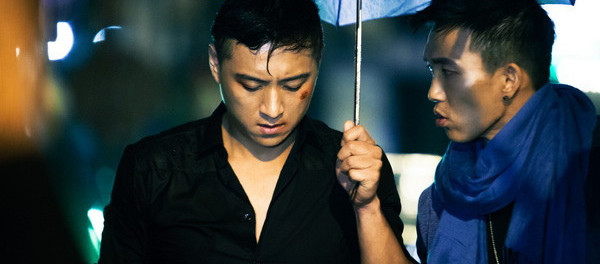Thanatos, Drunk: Aimless Meanderings of Tragedy
Set on the outskirts of Taipei, where the high-rises are visible at a distance, Thanatos, Drunk (original title Zui sheng meng si) is the story of Rat (Hong-Chi Lee), his alcoholic mother (Hsueh-feng Lu), his gay older brother Shanghe (played by Shang-Ho Huang) and night-club dancer and gigolo Shuo (Jen-Shuo Chen). The film tries to explore themes of belonging, coming of age, return of the prodigal son, abandonment with aging and youthful aimlessness that, with it, brings alcohol and drug abuse. While filmmaker Chang Tso-chi creates a dark and sometimes morbid narrative of these characters, who literally and figuratively live on the fringes of the mainstream, the film meanders through its thematic landscape trying hard to cling to one inherent idea that would convey what its raison d’être is.
From its long and poignant prologue to the climax of the film, the characters seem haunted by the demons of their existence, yet none of them really find themselves. Thanatos, Drunk isn’t able to engage with its narrative, for lack of a center of neither the plot nor its characters. Yet one is left with a deep sense of sympathy for all of them and how their lives unravel on screen.
The film opens with Rat and his alcoholic mother, as she reminisces about the tragedies of her life, abandonment by her husband and the helplessness of being a single mother. She frets for the son (Shanghe) who left home and went to the US. Rat tries to shake her from her tragic trance, asserting that he is still with her and present. But she is unable to escape her sense of doom. She slights him for spending all his time doing nothing and talking to ants (something he does poetically).
The film moves forward and we find Rat selling random vegetables at a local market, his mother dies suddenly and he finds himself working (sporadically) for Shuo. Shuo is the local playboy and male gigolo who is ‘popular’ with the girls and spends most of his time bedding Rat’s cousin. As Rat aimlessly moves between alcohol, hero-worship of Shuo and an unresolved sense of attachment for his mother, he runs into a girl on the street one day, who works as a sex-worker. They both develop some sort of a bond and begin exploring a friendship.
Rat’s older brother Shanghe returns home from the US, allegedly having lost his boyfriend. He finds a job at a film distribution company and is constantly critical of Rat and his aimless ways. He isn’t able to bond with his younger sibling, which leaves Shuo to act as Rat’s ‘mentor’ teaching him the ways of the world. Shuo himself struggles with deep insecurities about relationships and a loss of direction about his life; he spends time and money drinking in the company of friends and clients pretending to be the man of the hour. His story of sending money to his mother in the US is seen as make-believe, while deeply lonely inside, he thrives off being the life of every party. One day at work he bumps into an ex-wife, who reminds him of his daughter. His past haunts him as the scene ends with him being beaten up by a group of men, claiming to settle an old debt.
A shaken up and beaten Shuo seeks refuge in Shanghe, who he has been eyeing for sometime, owing to his free spirit, zest for life and gorgeous physique. While their night together doesn’t allow for Shuo or Shanghe to escape their emotional demons, nor does Rat find reprieve from his aimless meanderings, the film’s climax left me wondering what the point of it all was, the human condition being as fragile that it is.
Watch the film for its dark and aimless portrayal of its characters, not far from how most of us feel sometimes.
The film screens on October 1st as the closing film of the Ciné Tapis Rouge Taiwan at Cinema du Parc.







